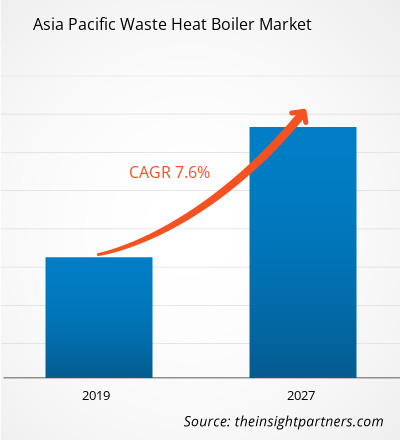The waste heat boiler market in Asia-Pacific is expected to grow from US$ 2.17 Bn in 2018 to US$ 4.18 Bn by the year 2027. This represents a CAGR of 7.6% from the year 2018 to 2027.
Waste heat boilers are one of the key energy consumption equipment. These solutions recover the waste heat into steams in order to generate power. Vendors are highly focused on identifying technical issues and pursuing R&D that enables the wide-scale use of waste heat boilers. R&D areas include materials and designs to extend equipment life, lessen maintenance time intervals, and offer reliable & consistent performance for several years. Emerging technologies offer enhanced recovering waste heat as compared to traditional methods. For instance, the Kalina cycle is one of the successful methods of recovering low to medium temperature waste heat. Vendors have a huge opportunity by focusing on new technologies that can recover heat from sources not typically considered for heat recoveries such as losses from heated product streams or sidewall losses.
In the future, the energy-efficient solutions would most likely to witness high demand. Waste heat boiler, energy-efficient equipment, is used to recover waste heat energy and can reduce future operating costs, capital investment, and utility systems costs. The performance of waste heater boilers is a key element in the efforts of commercial facilities to hold down utility costs. For maintenance and engineering procedures in various industries, businesses trying to provide efficient boiler performance, the efficiency of the boiler is decided by the proportion of heat output to the amount of fuel utilized.
India Waste heat boiler market is expected to grow at a good CAGR in the forecast period. According to IEA, India has enormous potential of combined heat & power systems backed by a growing number of installations of these systems across sugar mill, refinery & petrochemical, and other industrial sectors. Generally, gas & steam turbine major movers used in the CHP systems across India, as it provides a tremendous power generating capacity. Recently, in 2018, the Indian government announced the acquisition of UK combined heat and power firm Edina for enhancing the CHP market in India through the ‘as-a-service’ model. Thereby, such an initiative will further boost the demand for waste heat boiler in the Indian market. The figure given below highlights the revenue share of Rest of Asia-Pacific in the Asia-Pacific waste heat boiler market in the forecast period:
Rest of Asia-Pacific Waste Heat Boiler Market Revenue and Forecasts to 2027 (US$ Mn)

- This FREE sample will include data analysis, ranging from market trends to estimates and forecasts.
- This FREE sample will include data analysis, ranging from market trends to estimates and forecasts.
Asia-Pacific Waste Heat Boiler Market–Segmentation
Asia-Pacific Waste Heat Boiler Market By Waste Heat Temperature
- Medium Temperature
- High Temperature
- Ultra-High Temperature
Asia-Pacific Waste Heat Boiler Market By Waste Heat Source
- Oil Engine Exhaust
- Gas Engine Exhaust
- Gas Turbine Exhaust
- Incinerator Exit Gases
- Kiln & Furnace Gases
- Others
Asia-Pacific Waste Heat Boiler Market By Orientation
- Horizontal
- Vertical
Asia-Pacific Waste Heat Boiler Market By End-User
- Power Generation Utilities
- Oil & Gas
- Chemical
- Primary Metals
- Non-Metallic Minerals
- Others
Asia-Pacific Waste Heat Boiler Market By Country
- China
- Japan
- India
- Australia
- South Korea
- Rest of Asia-Pacific
Asia-Pacific Waste Heat Boiler Market-Companies Mentioned
- Alfa Laval
- CiTECH Energy Recovery Solutions (UK) LTD
- General Electric
- Kawasaki Heavy Industries, Ltd
- Nooter/Eriksen
- Bosch Group
- Thermax
- Thyssenkrupp AG
- Viessmann Group
- Zhengzhou Boiler Co., Ltd
Asia Pacific Waste Heat Boiler Report Scope
| Report Attribute | Details |
|---|---|
| Market size in 2018 | US$ 2.17 Billion |
| Market Size by 2027 | US$ 4.18 Billion |
| Global CAGR (2018 - 2027) | 7.6% |
| Historical Data | 2016-2017 |
| Forecast period | 2019-2027 |
| Segments Covered |
By Waste Heat Temperature
|
| Regions and Countries Covered | Asia-Pacific
|
| Market leaders and key company profiles |
- Historical Analysis (2 Years), Base Year, Forecast (7 Years) with CAGR
- PEST and SWOT Analysis
- Market Size Value / Volume - Global, Regional, Country
- Industry and Competitive Landscape
- Excel Dataset



Report Coverage
Revenue forecast, Company Analysis, Industry landscape, Growth factors, and Trends

Segment Covered
Waste Heat Temperature, Waste Heat Source, Orientation, End-user

Regional Scope
North America, Europe, Asia Pacific, Middle East & Africa, South & Central America

Country Scope
Australia, China, Japan, South Korea
Trends and growth analysis reports related to Manufacturing and Construction : READ MORE..
The List of Companies
- Alfa Laval
- CiTECH Energy Recovery Solutions (UK) LTD
- General Electric
- Kawasaki Heavy Industries, Ltd
- Nooter/Eriksen
- Bosch Group
- Thermax
- Thyssenkrupp AG
- Viessmann Group
- Zhengzhou Boiler Co., Ltd

 Get Free Sample For
Get Free Sample For